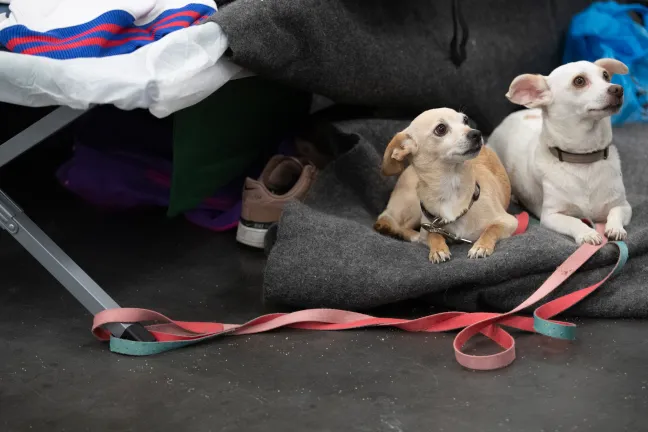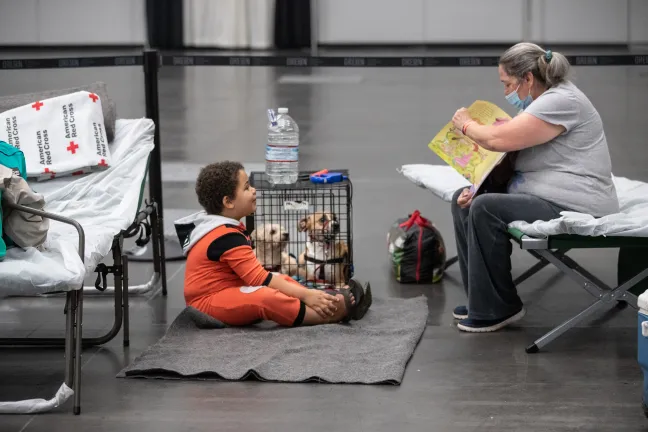Summer is officially here and with it comes an excessive heat watch throughout the Pacific Northwest that will remain in effect through early next week. Like humans, pets and animals are susceptible to surging temperatures. Heatstroke in animals is not only life threatening, it can be difficult to treat once it begins.
Overheating in pets typically occurs before heatstroke — that’s why prevention and hydration are key.
“Animals can’t sweat so they can't disperse heat like humans can,” said Jeanette Farrell, field manager for Multnomah County Animal Services. “They have to cool down by panting, laying on cool surfaces, and drinking water. If they don’t have access to these things, or cannot cool themselves through panting, their interior body temperature continues to rise, sending the body into a state of crisis. “
Pets also rely on the pads of their paws to cool down.
“Ideally we want pets to be indoors where humans are,” Farrell says. “Keep pets indoors as much as possible and do not over-exercise them.”
Steps to keep your pets cool
Take the following steps to make sure your pet stays cool and healthy throughout extreme heat:
Don't leave your pets in a parked car, even while running an errand. Learn what to do if you see a pet in a hot car.
Take your dog on bathroom breaks in the morning, during the coolest time of day.
As temperatures climb, avoid pavement and walk in a grassy area.
If you cannot hold the back of your hand to hot pavement for 7 seconds it is too hot to walk a dog.
Provide unlimited fresh, clean water for your pet; place some ice in their water bowl.
Avoid excessive exercise with your pet.
Seek air conditioning and stay indoors as much as possible.
If you must go outside, seek shade and avoid putting your pet in direct sunlight for long periods of time.
If your pet appears to be panting excessively (or if your cat is panting at all), wrap them in a wet towel, and check for symptoms of heatstroke. Learn more about heat stroke and symptoms for cats and dogs here.
Keep contact information for your local veterinarian on hand. You can contact Multnomah County Animal Services Dispatch at (503) 988-7387.
Signs of overheating:
Overheating typically occurs before heatstroke does. Symptoms of overheating can include:
Excessive panting or difficulty breathing.
Increased heart and respiratory rate, drooling, mild weakness, stupor or even collapse.
Seizures, bloody diarrhea and vomit along with an elevated body temperature of over 104° .
Visit Multnomah County Animal Services webpage to learn more about symptoms and treatment of heatstroke in cats and dogs.
Signs of heatstroke:
Signs of heatstroke can vary from cats to dogs.
For cats, be on the lookout for:
Rapid pulse and breathing
Redness of the tongue and mouth
Vomiting
Lethargy
Stumbling, staggering gait
Rectal temperature of over 105° F
If your pet is experiencing these symptoms, contact your veterinarian immediately.
Symptoms of heatstroke in dogs can include:
Excessive panting
Glassy eyes
Weakness
Fast heart rate
Drooling
Seizures
Vomiting
Diarrhea
Body temperature over 104° F.
Again, If your pet is experiencing these symptoms, contact your veterinarian immediately.
Cooling Shelters
Multnomah County’s three main cooling centers will be open starting Friday, June 25 at 1 p.m. to people and their pets. Pets must be confined in a kennel at cooling centers or kept on a leash.
COVID-19 precautions will be in place to the extent possible, while prioritizing the immediate risk of life-threatening heat. No one will be turned away. Staff will be masked and will ask guests to put on a mask when they are cool enough to do so.
While Multnomah County Animal Services can provide crates, litter boxes, bedding and other supplies — pet owners are encouraged to bring their own necessities such as food, water, water bowls, waste bags, toys and leashes.
Outdoor pets and wildlife
Bring cats and dogs, indoors as much as possible. Consider reaching out to community members or a neighbor to watch an outdoor pet if needed. Wildlife are also susceptible to heat. Consider keeping bird feeders full.
And keep a water dish on the ground, in the shade, for outdoor animals. This can help feral cats, squirrels, possums and other animals.
Never Leave Pets in Cars
If you have to run errands, leave your pets at home. And anytime you see an animal in a car, Multnomah County Animal Services recommends that you call MCAS Dispatch at (503) 988-7387. Dispatchers will ask you about what you observe, and advise of next steps. Animal Control Officers and municipal police departments can respond to assist you.


